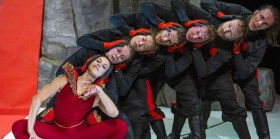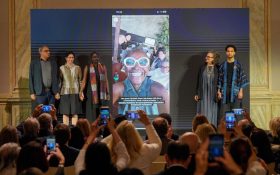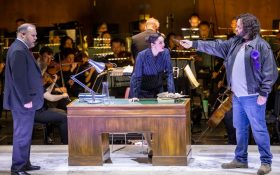At last year’s Edinburgh International Film Festival we at Birds Eye View (BEV) launched our First Weekenders Club Initiative, directly addressing audiences and their power to change the shape of the UK film industry at the box office. A simple promotional crusade to encourage our members to support and value women directors by purchasing tickets on the first weekend of release.
The importance of the first weekend on a films theatrical life-span and general success is overwhelming…
“There are plenty of very decent films which get shouldered aside because their opening weekend figures have been poor,” says Peter Bradshaw, of the Guardian.
With such a small percentage of female directors, it seems all the more crucial that the few films that are helmed by women don’t go down like a lead balloon the minute they hit our screens. One could say that women directed films breed an element of mistrust – the idea that they are ‘women’s films’ that their content will not satisfy a male demographic (and of course cinema going does include a great deal of 18-25 year old men). Whether women’s films are seen as a niche, is of course another issue, but we do know that box office figures speak volumes when a director embarks on their next project.
Last December, Birds Eye View First Weekenders Club teamed up with British director Martha Fiennes for the opening night of her much awaited second feature starring Penelope Cruz, Ralph Fiennes, Rhy Ifans, Kirsten Scott-Thomas, Ben Chaplin and Damien Lewis. Phew. With those names you’d expect the film to be emblazoned across the electrics of Leichester Square. Especially considering Fiennes’ outstanding directorial debut of 1999, Onegin.
However, Chromophobia is particularly significant when it comes to the question of box office impact. A multi-narrative, ambitious London based story about a group of seemingly disconnected individuals, the film closed Cannes back in 2005, yes THAT long ago. It’s taken over 18 months to get Chromophobia to UK audiences.
Reviews have been mixed – which is perhaps one reason for the film to be released on only one screen in London, and a few more nation-wide (as well as other production related hold ups making the film perhaps appear as ‘old news’ to some venues).
This is a competitive month for film releases… Chromophobia will be a whisper amongst the cacophony of big Christmas titles – needlessly so if there was a more active response on the side of audiences to discover this UK, star-studded curio and make up their own minds..
BEV caught up with Martha Fiennes to chat about Chromophobia and how important it’s opening weekend is to her.
BEV: Chromophobia is a totally modern study of London society, totally different from your first feature Onegin.
MF: I wanted to do something modern, I’d done Russian period movies, I wanted to play around with ideas and also break down with the structures of narrative that we’re all familiar with. I’d seen films where multiple stories overlap – more American…London is an incredible metropolis….It’s more multinational than LA, but with very different histories. There were certain characters I wanted to go in areas create that I felt just weren’t represented, the Kristin Scott Thomas character. Now there is a lot of money around, you only have to wander round Selfridges to know there are people who can afford this, I wanted to explore women’s relationship with shopping and guilt. This is what I was interested in exploring new areas.
BEV: Why ‘Chromophobia’?
MF: It did come later as a title. My husband was reading a funny article, very cleverly written and somewhere it referred to chromaphobia, not as fear of colour but fear of pretty much everything. I though that’s a good word and I wanted to use the word but not to say, this is a summary of my oeuvre, it’s sort of meaningless too.
BEV: Chromophobia is a multi-narrative piece with a star- studded ensemble cast. Tell us about the inspiration behind the ‘unlikeable’ character of Iona.
MF: Some people has challenged me that all you’re characters are very dark, but actually I like all the characters. I’m far more interested in the value system that is recognisably modern, you know, it’s our world, that they inhabit and we can recognise. When I wrote it I knew I needed to paint the character of Iona, the Nottinghill Gate, yummy mummy, I actually like her neurosis. I don’t blame her, I blame the values she has found herself in. She’s got everything that these magazines bombard us with. ‘I haven’t got that, …..’
It is so easy to say, ‘bitch’, but actually she is a human being, she doesn’t know what she is doing. She is trying every therapy under the sun. She is amusing to watch and nothing is working with sex, the child, the business, it is all crashing down around her. It is all about the values of the glossy magazine for me.
BEV: It’s an incredible film in terms of the diversity of environments we see the characters filmed in…
MF: They are all very different emotionally different environments. They are almost different films. I thought one is the posh drawing room and the other is the council estate, the other is the cool modernist. Not only are the settings different but the actual emotions and the ways they are shot. Somewhere in the back of mind it is trying to make sense of the culture of bombardment. The mobile phone, the email the on flight Tvs.
BEV: How important do you consider the first weekend of release to be?
MF: Of course first weekend are incredibly significant and important to the way the film is viewed and received certainly by distributors but by the public as well. It is completely critical. It sort of has to run on it’s own.
Chromophobia opened in December and can be seen at Cineworld Cinemas nationwide.
For more on Birds Eye View First Weekenders Club visit birds-eye-view.co.uk




